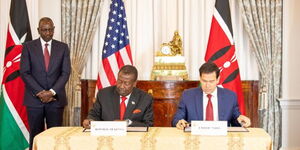Kenyan farmers and small exporters have received a one-year extension to comply with the European Union’s anti-deforestation rules, following a new proposal by the European Commission aimed at preventing disruptions in trade and easing pressure on the EU’s digital tracking system.
The decision comes after the commission announced that the EU Deforestation Regulation (EUDR), which seeks to ensure that goods entering the European market do not contribute to deforestation and was initially set to take effect on December 30, 2025, has been extended by a year.
Accordingly, under the new proposal, micro and small enterprises in countries seeking to export goods to the European nations will now have until December 30, 2026, to meet compliance requirements.
The extension comes after concerns that the EU’s online due diligence system, which tracks all deforestation-linked products entering the market, could face overload due to the large number of submissions expected from companies and suppliers worldwide.
For Kenya, one of Africa’s key agricultural exporters to Europe, this adjustment will offer relief to smallholder farmers and cooperatives dealing in tea, coffee, cocoa, and timber.
Additionally, it will give Kenyan farmers more time to align with the EU’s traceability and sustainability standards, which require proof that products are sourced from deforestation-free land.
According to the European Commission, the proposed changes will also simplify reporting requirements for small and micro producers from low-risk countries.
Instead of filing multiple due diligence statements, small suppliers will only make a single, one-off declaration in the EU’s digital system, or none at all if their data is already captured through national databases or exporters.
Large and medium-sized companies, which include European importers handling Kenyan produce, will still be required to comply by December 2025 but will benefit from a six-month grace period for checks and enforcement to ensure a smooth transition without disrupting supply chains.
In June this year, Kenyan exporters were handed yet another boost after the European Union (EU) classified the country as a low-risk nation under its new anti-deforestation regulations.
The reassurance came during a high-level meeting between Agriculture Cabinet Secretary Mutahi Kagwe and EU Ambassador to Kenya Henriette Geiger, held at Kilimo House in Nairobi on June 18.
The developments come at a time when Kenya’s exports to the EU are already strong, having hit Ksh450 billion in 2023. The EU remains Kenya’s largest export market, with Kenyan goods enjoying duty- and quota-free access under the EU-Kenya Economic Partnership Agreement, which came into effect on July 1, 2024
At the same time, the European Parliament and Council are now expected to review and adopt the proposal by the end of 2025, paving the way for a more practical rollout of the regulation without penalising small producers in developing countries.












